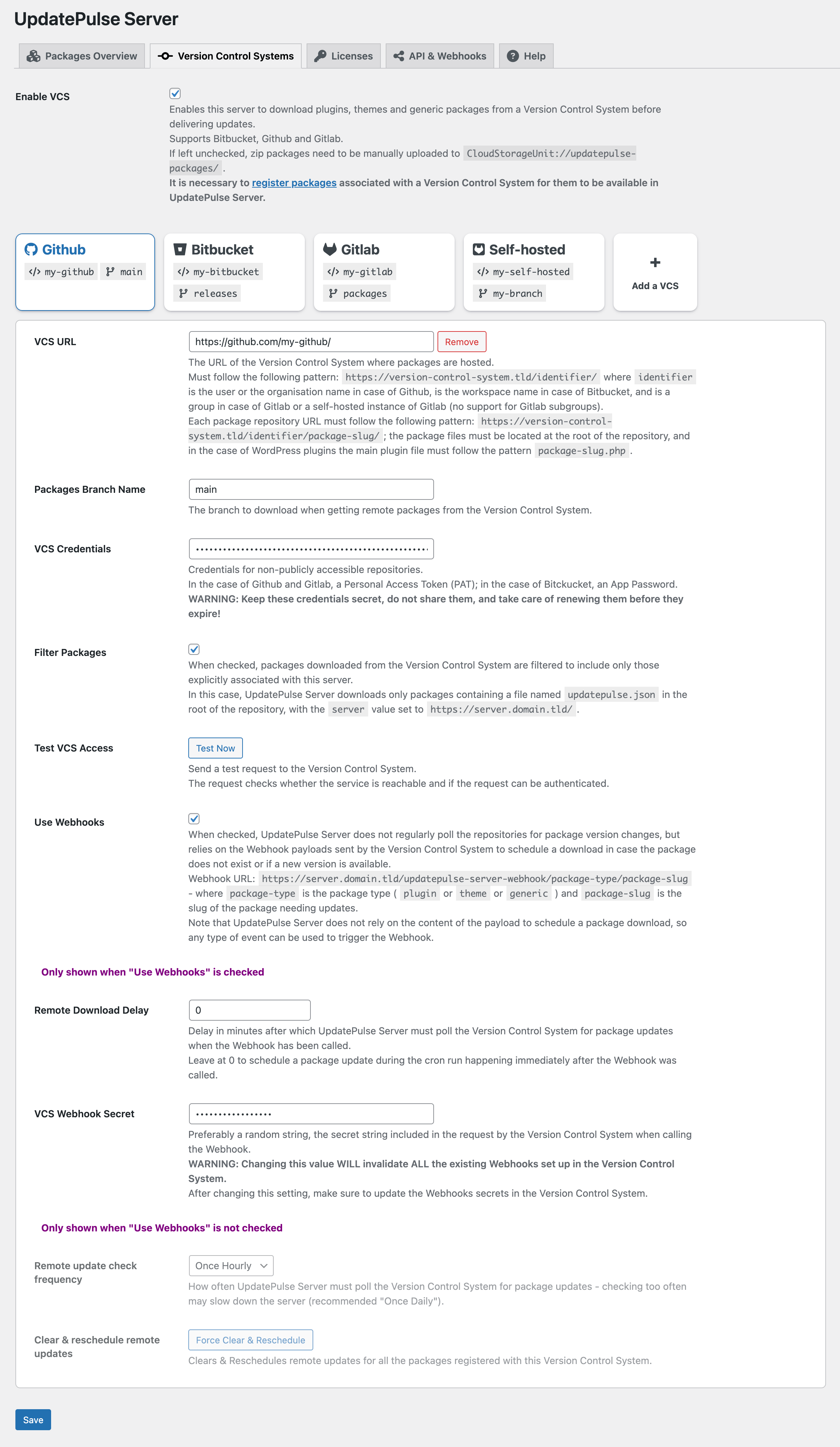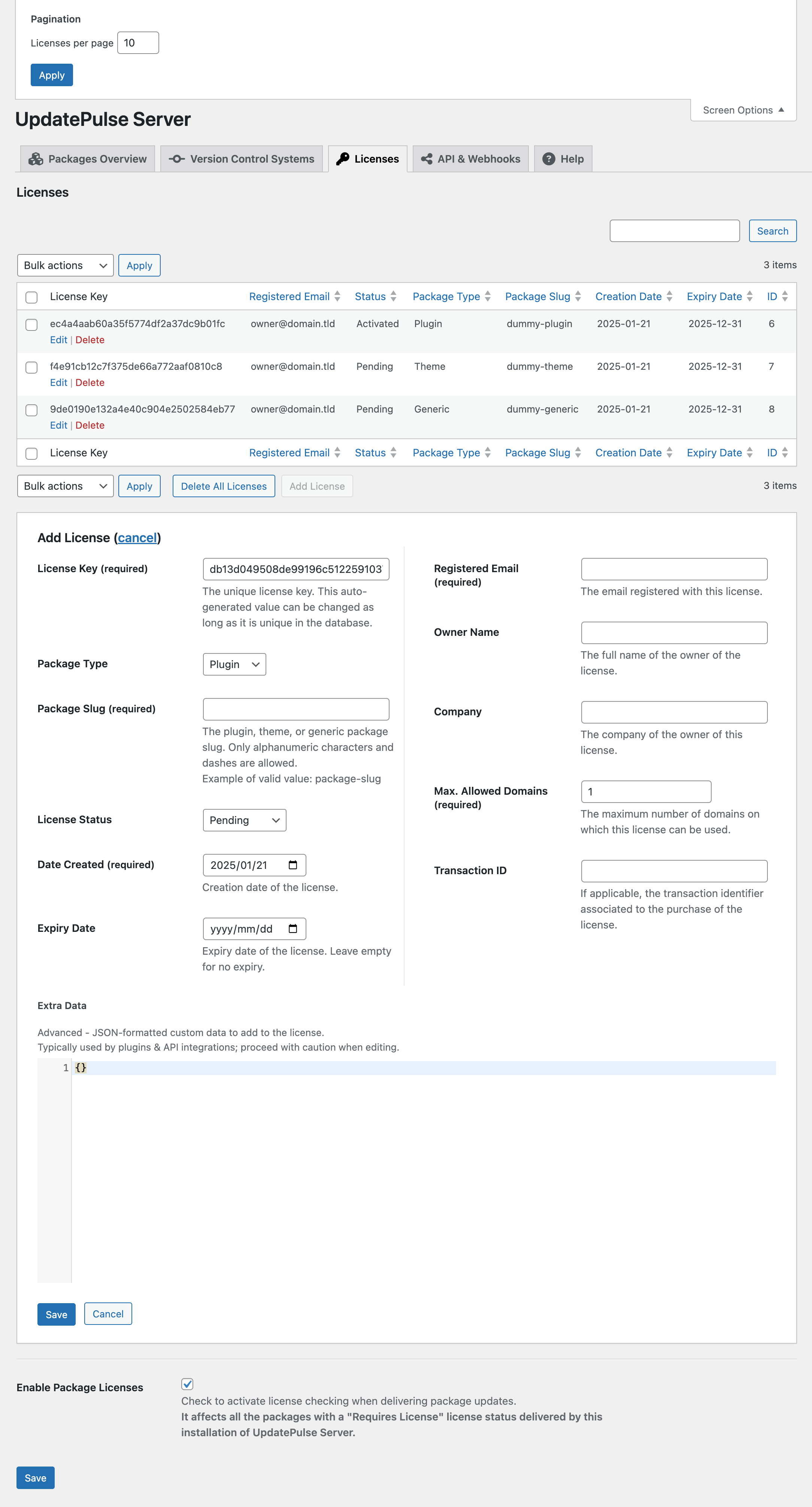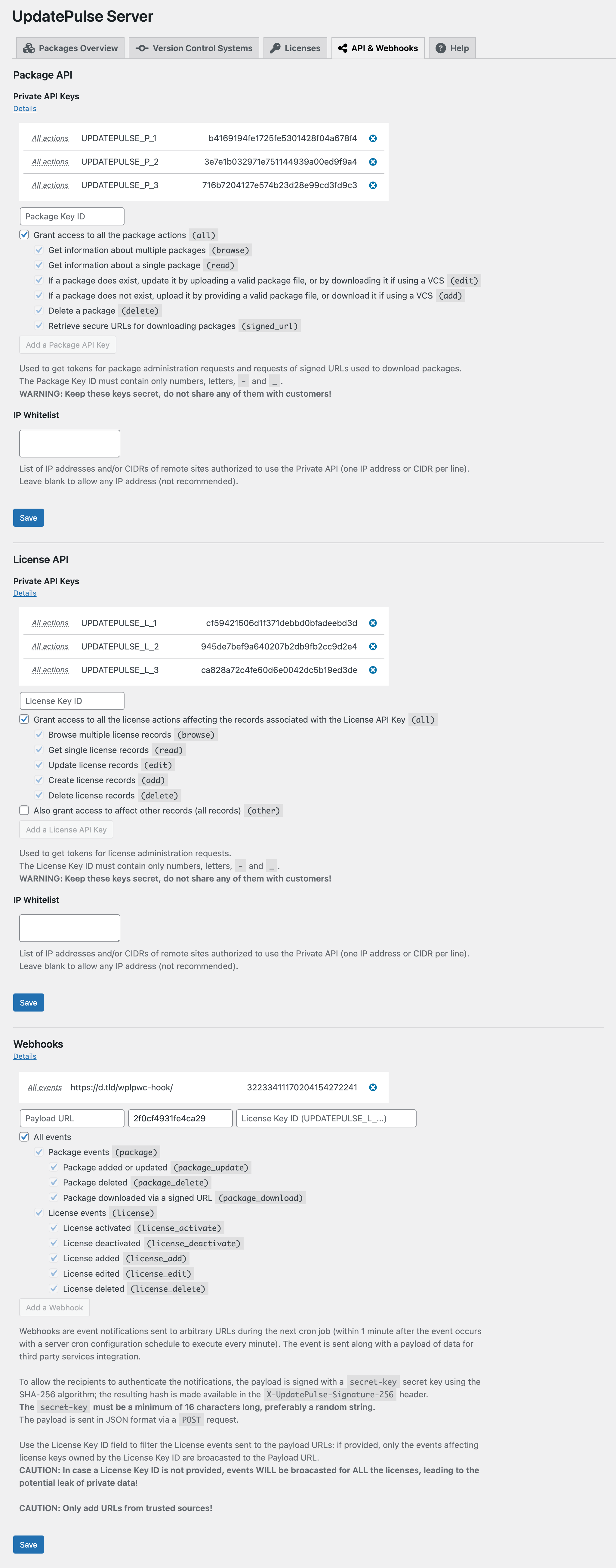Description
UpdatePulse Server allows developers to provide updates for software packages, including WordPress plugins and themes.
Some example use cases:
- provide updates for premium plugins or themes, with a license key
- provide custom theme or plugin updates to clients of a webdesign agency and not intended for the general public
- provide updates for a desktop software that integrates with UpdatePulse Server’s update and license API
Packages may be either uploaded directly, or downloaded automatically from configured Version Control Systems, public or private.
Package updates may require a license ; both packages and licenses can be managed through an API or a user interface within UpdatePulse Server.
Important notes
The target audience of this plugin is developers, not end-users.
Zip PHP extension is required.
For more information, available APIs, functions, actions and filters, see the plugin’s full documentation.
Make sure to read the full documentation and the content of the “Help” tab under “UpdatePulse Server” settings before opening an issue or contacting the author.
Overview
This plugin adds the following major features to WordPress:
- Package management: to manage update packages, showing a listing with Package Name, Version, Type, File Name, Size, File Modified and License Status; includes bulk operations to delete and download, and the ability to delete all the packages.
- Add Packages: Upload update packages from a local machine to the server, or download them to the server from a Version Control System.
- Version Control Systems: Instead of manually uploading packages, use Version Control Systems to host packages, and download them to UpdatePulse Server automatically. Supports Bitbucket, Github and Gitlab, as well as self-hosted installations of Gitlab.
- Cloud Storage: Instead of storing packages on the file system where UpdatePulse Server is installed, they can be stored on a cloud storage service, as long as it is compatible with Amazon S3’s API. Examples: Amazon S3, Cloudflare R2, Backblaze B2, MinIO, and many more!
- UpdatePulse Server does not install executable code from the Version Control System onto your installation of WordPress, and does not track your activity. It is designed to only store packages and licenses, and to provide updates when they are requested.
- Licenses: manage licenses with License Key, Registered Email, Status, Package Type, Package Slug, Creation Date, and Expiration Date; add and edit them with a form, or use the API for more control. Licenses prevent packages from being updated without a valid license. Licenses Keys are generated automatically by default and the values are unguessable (it is recommended to keep the default). When checking the validity of licenses, an extra license signature is also checked to prevent the use of a license on more than the configured allowed domains.
- API: UpdatePulse Server provides APIs to manage packages and licenses. The APIs keys are secured with a system of tokens: the API keys are never shared over the network, acquiring a token requires signed payloads, and the tokens have a limited lifetime. For more details about tokens and security, see the Nonce API documentation.
To connect their plugins or themes and UpdatePulse Server, developers can find integration examples in the UpdatePulse Server Integration Examples repository – theme and plugin examples rely heavily on the popular Plugin Update Checker by Yahnis Elsts.
Companion Plugins
The following plugins are compatible with UpdatePulse Server and can be used to extend its functionality:
* Updatepulse Blocks: a seamless way to display packages from UpdatePulse Server directly within your site using the WordPress Block Editor or shortcodes.
* UpdatePulse for WooCommerce: a WooCommerce connector for UpdatePulse Server, allowing you to sell licensed packages through your WooCommerce store, either on the same WordPress installation or a separate store site.
Developers are encouraged to build plugins and themes integrated with UpdatePulse Server, leveraging its publicly available functions, actions and filters, or by making use of the provided APIs.
If you wish to see your plugin added to this list, please contact the author.
Troubleshooting
Please read the plugin FAQ, there is a lot that may help you there!
UpdatePulse Server is regularly updated for compatibility, and bug reports are welcome, preferably on Github. Pull Requests from developers following the WordPress Coding Standards (WordPress-Extra ruleset) are highly appreciated and will be credited upon merge.
In case the plugin has not been updated for a while, no panic: it simply means the compatibility flag has not been changed, and it very likely remains compatible with the latest version of WordPress. This is because it was designed with long-term compatibility in mind from the ground up.
Each bug report will be addressed in a timely manner if properly documented – previously unanswered general inquiries and issues reported on the WordPress forum may take significantly longer to receive a response (if any).
Only issues occurring with WordPress core, WooCommerce, and default WordPress themes (incl. WooCommerce Storefront) will be considered.
Troubleshooting involving 3rd-party plugins or themes will not be addressed on the WordPress support forum.
Installation
This section describes how to install the plugin and get it working.
- Upload the plugin files to the
/wp-content/plugins/updatepulse-serverdirectory, or install the plugin through the WordPress plugins screen directly - Activate the plugin through the ‘Plugins’ screen in WordPress
- Edit plugin settings
FAQ
-
How do I use UpdatePulse Server?
-
UpdatePulse Server is a plugin for developers, not end-users. It allows developers to provide updates for their software packages, including WordPress plugins and themes. For more information on how to use it, please refer to the documentation.
-
How do I connect my plugin/theme to UpdatePulse Server?
-
To connect your plugin or theme to UpdatePulse Server, you can either use one of the integration examples provided in the UpdatePulse Server Integration Examples, or develop your own on top of Plugin Update Checker.
If you decide to develop your own, the key is to call the UpdatePulse Server Update API to check for updates, with the necessary information in the request. The API will return a JSON response with the update information, which you can then use to display the update notification, check for a license for your plugin or theme, and download the update package.
-
How does the license system work?
-
The license system allows developers to manage licenses for their software packages. Licenses prevent packages from being updated without a valid license. License Keys are generated automatically by default and the values are unguessable (it is recommended to keep the default). When checking the validity of licenses, an extra license signature is also checked to prevent the use of a license on more than the configured allowed domains.
-
How do I manage packages?
-
You can manage packages through the UpdatePulse Server interface, through the API, or by letting the plugin download them automatically from a Version Control System (preferred). The interface allows you to view a listing of packages, view details, delete, download, and upload new packages manually (discouraged).
-
I have a problem with the plugin, what should I do?
-
If you have a problem with the plugin, please check the FAQ and the documentation first.
Then, make sure to flush your WordPress permalinks (Settings > Permalinks > Save Changes), clear your browser cache, and clear any caching plugins you may have installed. If you are using a CDN, make sure to clear the cache there as well.
Make sure you are not trying to update a package installed alongside UpdatePulse Server – the package must be installed on a different WordPress installation.
If you still have a problem, please open an issue on GitHub with a detailed description of the problem, including any error messages you are receiving, and most importantly, the steps to reproduce the issue, in details.
Only issues occurring with WordPress core, WooCommerce, and default WordPress themes (incl. WooCommerce Storefront) will be considered: integration with 3rd-party plugins or themes will only be addressed if you can provide a patch in a pull request, and if this makes sense for the author. If not, please either contact the author of the plugin/theme you are having issues with, or provide your own integration with a custom plugin.
-
How can I sell package licenses?
-
UpdatePulse Server does not provide a built-in way to sell licenses. To sell licenses, your chosen e-commerce solution must be integrated with UpdatePulse Server License API. This can be done by creating a custom plugin that connects your e-commerce solution with UpdatePulse Server License API, or by using an existing integration if available. At this time, there is no official e-commerce integration plugin for UpdatePulse Server.
-
Is UpdatePulse Server compatible with X Plugin/Theme? with multisite?
-
UpdatePulse Server by itself does not provide any frontend functionality to your users.
As a general rule, the more isolated UpdatePulse Server is from the rest of your ecosystem, the better, as it allows the server to perform without interference: it is not meant to be used alongside other plugins or themes, but more as a standalone server.
UpdatePulse Server is not meant to be used in a multisite environment either: it is a server delivering packages and licenses to clients, and has no place in a multisite environment.
If you still decide to use UpdatePulse Server on a website not solely dedicated to it, it is still possible ; to avoid interference, you may want to add the MU Plugin
upserv-plugins-optimizer.phpprovided in the UpdatePulse Server Integration repository to bypass plugins and themes when calling the UpdatePulse Server APIs.
Reviews
Contributors & Developers
“UpdatePulse Server” is open source software. The following people have contributed to this plugin.
ContributorsTranslate “UpdatePulse Server” into your language.
Interested in development?
Browse the code, check out the SVN repository, or subscribe to the development log by RSS.
Changelog
1.0.10
- Introduce constant
PUC_FORCE_BRANCHto bypass tags & releases in VCS detection strategies - Minor fix
- Fix activation issue –
WP_Filesystemcall
1.0.9
- Schedule mode: remove package metadata files when deleting packages
- Schedule mode: make sure to reinitialise the update checker to avoid slug conflicts
1.0.8
- Fix scheduled mode package overrides. After update, if using this mode: delete all packages and re-register them ; remove any remaining
jsonfiles fromwp-content/uploads/updatepulse-server/metadatafolder ; use the “Force Clear & Reschedule” button in the VCS settings - Fix VCS candidates with webhook mode
1.0.7
- Full documentation of all classes and functions
1.0.6
- Fix webhook payload handling (thanks @eHtmlu on github)
- Fix webhook payload scheduling (thanks @BabaYaga0179 on github)
- Implement a VCS candidates logic to handle events that do not specify a branch; gracefully fail with a message in the response if multiple candidates are found
- Major in-code and .md documentation improvements
1.0.5
- Fix JSON details modal view – escaping characters
- Make sure to differenciate between
file_last_modified(“File Modified”, the time the file was changed on the file system) andlast_updated(package version update time)
1.0.4
- More flexibility when parsing
Require Licenseheader - Fix VCS test
- Fix file system permission check
1.0.3
- Minor Package API fix
- All API: remove
JSON_NUMERIC_CHECKwhen encoding output as it creates issues with values like version numbers. - Fix deprecated PHP 8.3 calls to
get_class() - Add a URL to test the Update API endpoint in Packages JSON details
- Minor code cleanup
1.0.2
- Minor Package API fix
- Minor License API fix
- Minor License Server fix
- Improve record delete
- Expiry => Expiration in all UI
- Improved Licenses table styles
- Add
@packageto main plugin file - Hard-force PHP min version to 8.0
- Fix API details modal
- Fix webhooks with empty license API keys (not recommended)
- Fix minor scheduler issue
1.0.1
- Minor readme updates
- Minor package API fixes
- Manual upload validation fix
- Cloud storage hooks fix
1.0
Major rewrite from the original WP Plugins Update Server – renamed to UpdatePulse Server, many new features, improvements and bugfixes. No upgrade path from WPPUS.





